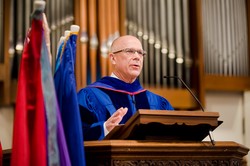Theological seminaries exist to serve the gospel of Jesus Christ, not themselves or the institutional church, the Rev. James L. (Jim) McDonald told the packed First Presbyterian Church here Feb. 11 as he was inaugurated as the 11th president of San Francisco Theological Seminary (SFTS).
“SFTS and every seminary is first and foremost here to serve not itself nor its institutional survival and self-interest, but something larger, something more profound,” McDonald ― a former top executive at the Christian anti-hunger organization Bread for the World ― said.
“If seminaries serve the Gospel,” he said, “the church will thrive.”
Thus, the key role of seminaries is to nurture Christian spirituality in its students and in the church, McDonald said. Speaking on Mark 6:30-44 ― the story of Jesus taking his disciples on a “retreat” ― he said “the need for a place that summons emotional and moral clarity, and deepens our understanding of the Gospel and our call to serve it, will only grow in a world increasingly wedded to the marvels and perils of high-speed electronics and communication.”
The desire for emotional and moral clarity is universal, McDonald said. Those who gathered around Jesus in the story from Mark had no common bond, no unifying purpose, no sense of relationship to one another except this,” he said, “they were listening to Jesus. It was a gathering of strangers. Perhaps like a church, or a seminary.”
Diversity, McDonald said, “is a hallmark of the presence of the Holy Spirit... The Holy Spirit gives us the capacity as people from different cultures to hear and learn from each other.”
That’s particularly crucial as the United States approaches the time when there is no racial ethnic majority in the country, he said, echoing the Rev. Frank Yamada, who was installed two days earlier as president of McCormick Theological Seminary in Chicago.
“The possibilities of multi-racial, multi-cultural, global education will come not simply from recruiting a diverse student body to our campus,” McDonald said, “but primarily by structuring our educational methods and experiences, as well as our community life, to draw out and explore-in-depth the social and cultural dimensions, life experiences and perspectives that SFTS students bring with them.”
Calling particularly for greater partnership with the Hispanic/Latino community, which comprises a third of the population in the western states, McDonald said, “The church isn’t dying. It’s just changing its face in our midst. The real presence of Christ is all around us, if we only had the eyes to see and the ears to hear.”
Noting that Jesus’ first response to the crowd that gathered was compassion, McDonald said, “SFTS should be a place where teaching is motivated by compassion, and where compassion is taught… and as compassion is cultivated in the classroom and community, it’s only natural that our embrace of compassion would take us into public life and to seek justice.”
Directly addressing the inaugural activities’ theme ― “Faith and Public Life” ― McDonald said, “As we become more and more a place of compassionate teaching, we set the stage, and lay the groundwork, for doing justice, because compassion by itself is not enough. We also need to take concrete steps to change our relationship with those whom we have alienated or from whom we feel estranged.
“The Gospel of Jesus Christ that this seminary should serve,” he said, “is incarnational and relational.”
As servants of the Gospel. McDonald said, “We are signs of the real presence of Christ in our midst. Our primary task is not self-preservation, but the proclamation of the Gospel, the demonstration of Christ’s saving presence in our world.”
That means that seminarians ― and all Christians “should be, at the heart of who we are, evangelical, McDonald insisted, “not in some narrow, ideological sense, but in the broadest, Biblical sense.
“We are bearers of the Good News,” he said. “Not only are we are tellers of the story of God’s saving work in human history. We are the continuation of that story ― messengers and message rolled into one.

